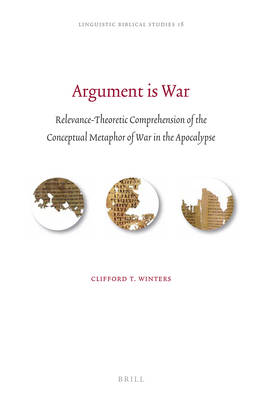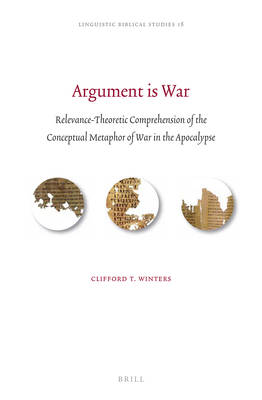
- Afhalen na 1 uur in een winkel met voorraad
- Gratis thuislevering in België vanaf € 30
- Ruim aanbod met 7 miljoen producten
- Afhalen na 1 uur in een winkel met voorraad
- Gratis thuislevering in België vanaf € 30
- Ruim aanbod met 7 miljoen producten
Zoeken
Argument Is War: Relevance-Theoretic Comprehension of the Conceptual Metaphor of War in the Apocalypse
Clifford Winters
€ 418,45
+ 836 punten
Omschrijving
In Argument is War: Relevance-Theoretic Comprehension of the Conceptual Metaphor of War in the Apocalypse, Clifford T. Winters demonstrates that the apparent war in the Apocalypse is rather telling the story of the gospel: how Christ will restore Israel and, through them, the rest of the world. When Revelation is viewed through the corrective lens of cognitive linguistics, its violence becomes victory, its violent characters become Christ, and its bloody end becomes the blessed beginning of the New Jerusalem. Revelation is simply telling the story of the early church (the Gospels and Acts) to the early church, and it is using a conceptual metaphor ('ARGUMENT IS WAR') to do it.
Specificaties
Betrokkenen
- Auteur(s):
- Uitgeverij:
Inhoud
- Aantal bladzijden:
- 384
- Taal:
- Engels
- Reeks:
- Reeksnummer:
- nr. 18
Eigenschappen
- Productcode (EAN):
- 9789004435735
- Verschijningsdatum:
- 17/09/2020
- Uitvoering:
- Hardcover
- Formaat:
- Genaaid
- Afmetingen:
- 155 mm x 235 mm
- Gewicht:
- 691 g

Alleen bij Standaard Boekhandel
+ 836 punten op je klantenkaart van Standaard Boekhandel
Beoordelingen
We publiceren alleen reviews die voldoen aan de voorwaarden voor reviews. Bekijk onze voorwaarden voor reviews.








